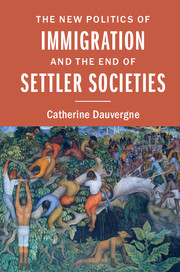5 - The end of multiculturalism
from PART 1 - THE END OF SETTLER SOCIETIES
Published online by Cambridge University Press: 05 March 2016
Summary
The third factor contributing to the end of settler societies is the demise of multiculturalism. This statement invites objections from everyone who hears it. On the one hand, people point to the evident diversity in most Western democracies these days and raise an empirical objection to the idea of demise. On the other hand, the objection comes from those who assert that as a scholarly argument the end of multiculturalism has already been proclaimed, and thus it is not a claim worth making. Finally, there are those who argue that multiculturalism as a social and political idea is as vital as ever, and thus not in decline at all. The objections cover a range of variations on these themes, and a significant part of the work of this chapter is to issue responses.
Multiculturalism is a national project. It is a commitment to a vision of nation-building through immigration, where people from around the world join together as one nation, but bring with them and continue to embrace their own “cultures” from elsewhere. The multicultural nation is not simply a pastiche, however. It requires some core commitments from its citizens, often articulated as tolerance, respect for diversity, and an embrace of freedoms of speech and association that guarantee a space for culture. A commitment to democracy is often included on this list but because multiculturalism emphasizes groups, democracy is not always a straightforward fit. Majoritarian versions of democracy clash with multiculturalism because protection for minorities is one of its central tenets. All of these things, because they are shared by all members of the nation, are by necessity considered to be something other than “culture.”
At this point another objection arises, coming from anyone with some training in a discipline such as anthropology that has devoted serious time and effort to defining culture. It is absolutely true that my definition does not engage with that serious scholarly effort to understand culture. And neither does multiculturalism. Indeed, multiculturalism relies on an impoverished understanding of culture, and this is a central factor in explaining its demise.
Multiculturalism is the end phase of the settler society. Or at least it is the end phase for those most successful settler societies that form the paragon examples. Recalling Chapter 2, the settler society begins as a blank canvas, onto which settlers bring their own (European) identities.
- Type
- Chapter
- Information
- Publisher: Cambridge University PressPrint publication year: 2016



